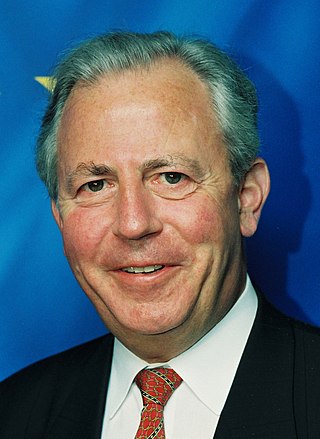Related Research Articles

The European People's Party Group is a centre-right political group of the European Parliament consisting of deputies (MEPs) from the member parties of the European People's Party (EPP). Sometimes it also includes independent MEPs and/or deputies from unaffiliated national parties. The EPP Group comprises politicians of Christian-democratic, conservative and liberal-conservative orientation.

The president of the European Commission is the head of the European Commission, the executive branch of the European Union (EU). The president of the Commission leads a cabinet of Commissioners, referred to as the College. The president is empowered to allocate portfolios among, reshuffle, or dismiss Commissioners as necessary. The College directs the commission's civil service, sets the policy agenda and determines the legislative proposals it produces. The commission is the only body that can propose or draft bills to become EU laws.

The 1999 European Parliament election was a European election for all 626 members of the European Parliament held across the 15 European Union member states on 10, 11 and 13 June 1999. The voter turn-out was generally low, except in Belgium and Luxembourg, where voting is compulsory and where national elections were held that same day. This was the first election where Austria, Finland and Sweden voted alongside the other member states, having joined in 1995 and voted separately. The next election was held in 2004.

The 2004 European Parliament election was held between 10 and 13 June 2004 in the 25 member states of the European Union, using varying election days according to local custom. The European Parliamental parties could not be voted for, but elected national parties aggregated in European Parliamental parties after the elections.
An election of Members of the European Parliament representing Netherlands constituency for the 2004–2009 term of the European Parliament was held on 10 June 2004. It was part of the wider 2004 European election. Fifteen parties competed in a D'Hondt type election for 27 seats..

The president of the European Parliament presides over the debates and activities of the European Parliament. They also represent the Parliament within the European Union (EU) and internationally. The president's signature is required for laws initatied under co-decision and the EU budget.

The Santer Commission was the European Commission in office between 23 January 1995 and 15 March 1999. The administration was led by Jacques Santer.
This article gives an overview of liberalism in Slovenia. It is limited to liberal parties with substantial support, mainly proved by having had a representation in parliament. The sign ⇒ means a reference to another party in that scheme. For inclusion in this scheme it isn't necessary so that parties labeled themselves as a liberal party.
The Barroso Commission was the European Commission in office from 22 November 2004 until 31 October 2014. Its president was José Manuel Barroso, who presided over 27 other commissioners. On 16 September 2009 Barroso was re-elected by the European Parliament for a further five years and his Commission was approved to take office on 9 February 2010.

The political groups of the European Parliament are the officially recognised political groups consisting of legislators of aligned ideologies in the European Parliament.
Pan-European liberalism has been a political force since the establishment of the European Liberal Democrat and Reform Party in 1976.

The 2009 European Parliament election was held in the 27 member states of the European Union (EU) between 4 and 7 June 2009. A total of 736 Members of the European Parliament (MEPs) were elected to represent some 500 million Europeans, making these the biggest trans-national elections in history. An additional 18 observers were pre-elected.

This article describes the party affiliations of the leaders of each member-state represented in the European Council during the year 2002. The list below gives the political party that each head of government, or head of state, belonged to at the national level, as well as the European political alliance to which that national party belonged. The states are listed from most to least populous. More populous states have greater influence in the council, in accordance with the system of Qualified Majority Voting.
The 1996 European Parliament election in Austria was the election of the delegation from Austria to the European Parliament in 1996.
The 1996 European Parliament election in Finland was the first election of the Finnish delegation to the European Parliament.

This article describes the party affiliations of leaders of each member-state represented in the European Council during the year 2009. The list below gives the political party that each head of government, or head of state, belongs to at the national level, as well as the European political alliance to which that national party belongs. The states are listed from most to least populous. More populous states have greater influence in the council, in accordance with the system of Qualified Majority Voting.
The Group of the European Liberal Democrat and Reform Party was a liberal political group of the European Parliament between 1976 and 2004. The group comprised the European Liberal Democrat and Reform Party and its constituent national-level parties, variously of liberal, centrist and agrarian orientation.

The Progressive Alliance of Socialists and Democrats (S&D) is the political group in the European Parliament of the Party of European Socialists (PES). The Progressive Alliance of Socialists and Democrats was officially founded as a Socialist Group on 29 June 1953 which makes it the second oldest political group in the European Parliament after Renew Europe (Renew). It adopted its present-day name on 23 June 2009. Centre-left in orientation, the group mostly comprises social-democratic parties and is affiliated with the Progressive Alliance and Socialist International.
References
- ↑ "Lista posłów | Posłowie do PE | Parlament Europejski | wszystkie kadencje | A". www.europarl.europa.eu (in Polish). Retrieved 2022-09-10.